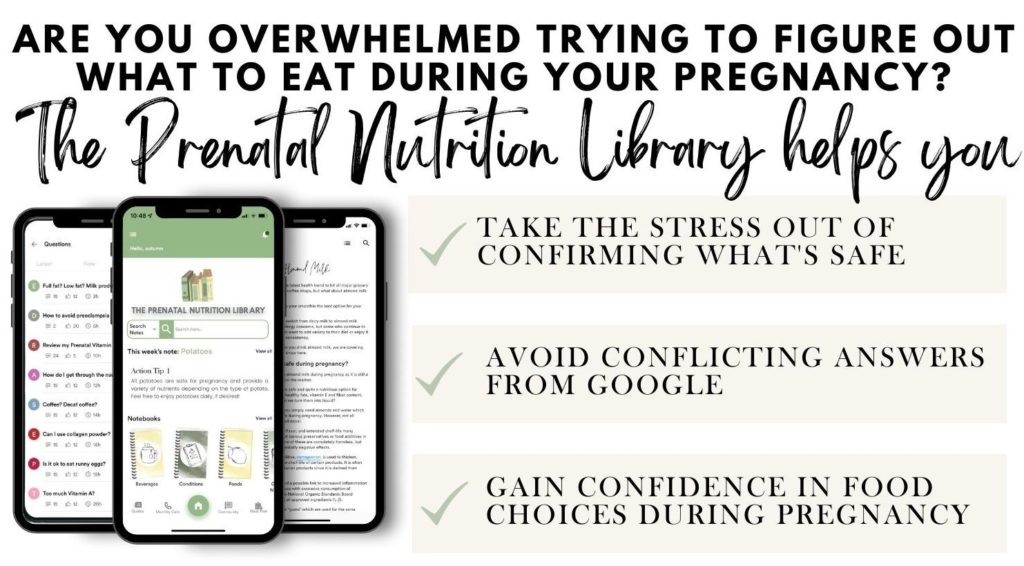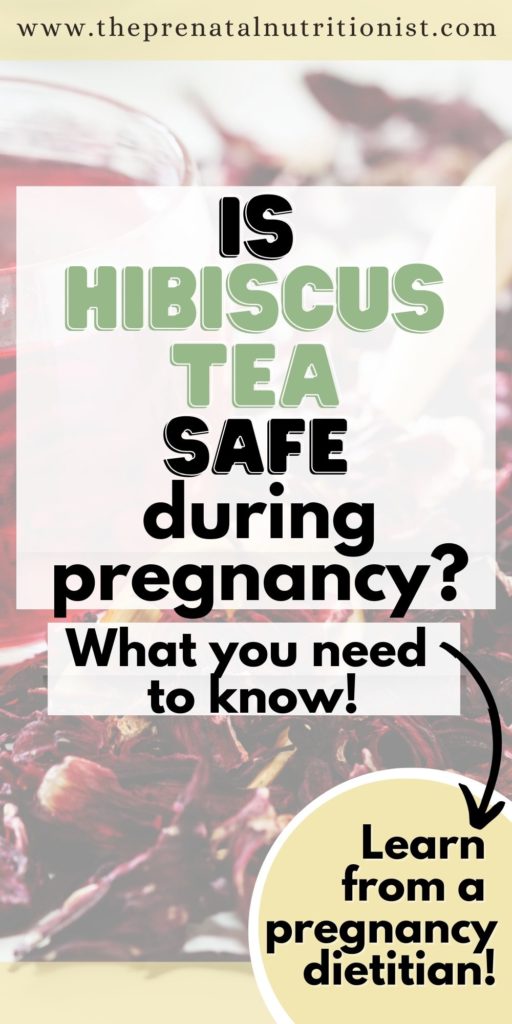
Pregnancy is an experience that can be just as overwhelming as it is wonderful. Your body seems to change every day, and there tends to be a mix of emotions from day to day and month to month. Add to that trying to figure out what’s safe and unsafe to eat amidst all the myths out there, and it’s no wonder so many people feel overwhelmed during pregnancy.
Because expectant mothers are advised to limit their caffeine intake, many women look to replace their daily cups of coffee with tea. However, not all kinds of tea are safe to drink during pregnancy.
Hibiscus tea is delicious, caffeine-free, and has a range of potential benefits and uses outside of pregnancy. But is it safe to drink during pregnancy? Or should you avoid hibiscus tea if you’re expecting? Let’s get into it.
Is Hibiscus Tea Safe During Pregnancy?
Hibiscus tea is one of the more popular types of tea consumed around the world. People drink hibiscus tea not only for its taste but for its health benefits.
But what about during pregnancy? Are there any special considerations or potential risks? Let’s discuss the deal with hibiscus tea during pregnancy below.
What Is Hibiscus Tea?
Hibiscus tea, also called sorrel tea or sour tea, is an aromatic tea made from parts of the tropical Hibiscus sabdariffa flowers. These flowers are native to Africa but grow in tropical and subtropical areas like Mexico, Thailand, and China.
The dried petals of the flower are brewed to make a cup of hibiscus tea. It makes a delicious, tart hot or cold tea with a cranberry-like flavor. Plus, various parts of the hibiscus plant can be used to make paper, rope, and traditional medicines.
Hibiscus is loaded with antioxidants, including vitamin C. Some research suggests that there may be health benefits to consuming hibiscus, including the potential to help lower blood pressure, support the immune system, and contribute to healthy cholesterol levels. It’s also often used for other uses like UTI prevention and reducing constipation, but no clear evidence supports these uses.
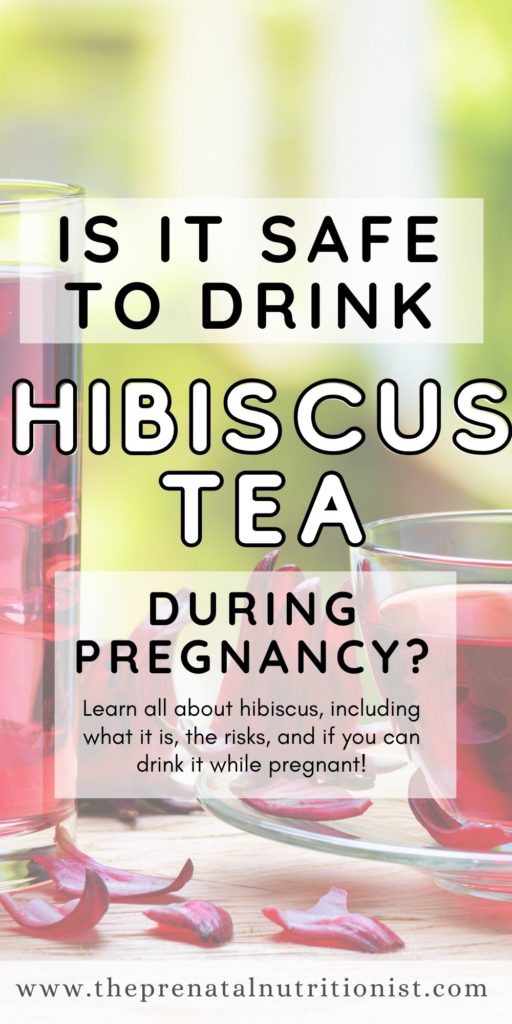
Is It Safe To Drink Hibiscus Tea During Pregnancy?
Hibiscus tea is a vibrant and aromatic herbal tea. However, it’s best avoided during pregnancy.
Although hibiscus is generally considered safe outside of pregnancy for the general population, there are question marks on its consumption during pregnancy. Unfortunately, we don’t have a definitive answer on the safety of hibiscus during pregnancy, leading us to take caution.
Based on data from animal models, hibiscus is thought to be a menstrual stimulant and could possibly put you at a higher risk of miscarriage.
Nutrition science during pregnancy is tricky for ethical reasons. At this point, most of the research on hibiscus tea in pregnancy boils down to these few animal studies. The outcomes of these animal studies, as well as the lack of research on this herb during pregnancy as a whole, lead us to recommend avoiding it during pregnancy.
If you’ve already consumed hibiscus during pregnancy, the truth is there is nothing you can do retroactively. We’d recommend avoiding hibiscus teas and supplements moving forward in your pregnancy.
If you have any questions or concerns about whether or not to consume something during pregnancy, I encourage you to search The Prenatal Nutrition Library and consult your healthcare team.
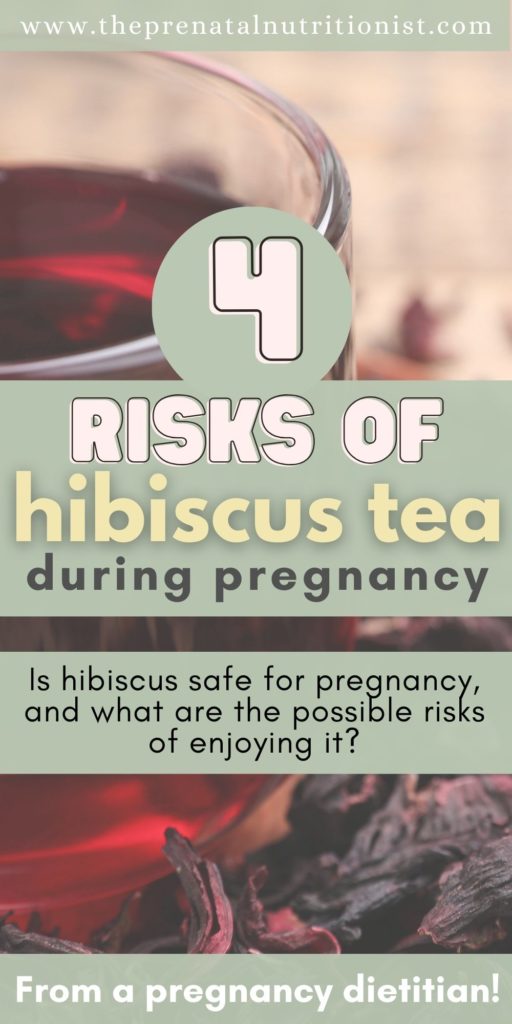
Potential Risks Of Drinking Hibiscus Tea During Pregnancy
Miscarriage In Early Pregnancy
Hibiscus has been shown in animal models to stimulate menstruation by increasing blood flow to the uterus. This could lead to side effects like cramping, bleeding, and miscarriage, particularly in early pregnancy. Although it’s important to reiterate, this is an animal study and does not always translate to humans!
Increased Risk Of Preterm Labor
Drinking hibiscus tea during pregnancy is thought to have the potential to cause uterine contractions. Pregnant women who consume large amounts of hibiscus tea during pregnancy could possibly be at risk for preterm labor.
Drinking hibiscus tea is often mentioned as a way to encourage the labor process during the third trimester. The temptation is understandable, especially once you reach full term. However, studies examining pregnant rats have found that hibiscus inhibited the strength and frequency of contractions in the bladder and uterus.
Low Blood Pressure
Regularly consuming hibiscus tea may lower blood pressure. This, of course, is a benefit for some individuals. If someone is already at risk for blood pressure that is too low, consuming hibiscus may be a potential risk, though!
It may negatively impact fertility.
Some studies have found that one type of hibiscus, Hibiscus rosa Sinensis (closely related to the other type, called Hibiscus sabdariffa), prevents fertilized embryos from implanting in the uterus. This led researchers to theorize that hibiscus could create an environment that did not allow implantation in the womb.
Hibiscus has also been found to alter hormones in animal studies and is thought to have the potential to affect periods and ovulation in humans. In fact, one such study found hibiscus caused changes in the ovaries and prevented regular ovulation.
For these reasons, as well as hibiscus’s potential to interfere with the production of estrogen, we recommend avoiding hibiscus while actively trying to conceive.
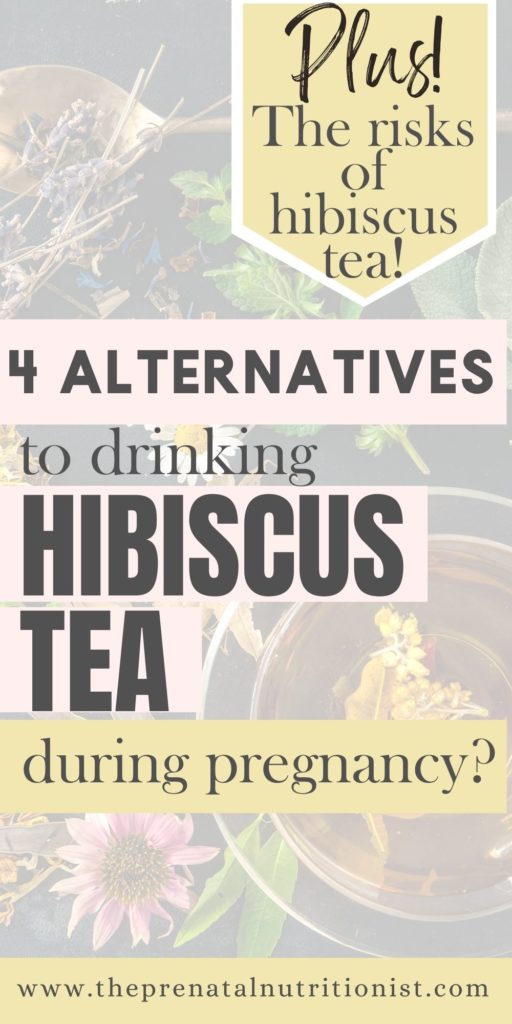
Hibiscus Tea Alternatives
Ginger Tea
For many people, ginger tea is an effective morning sickness remedy. Although it doesn’t work for everyone, ginger tea has been shown to reduce vomiting and nausea in some pregnancies.
Ginger tea may also improve digestion, support the immune system, help support healthy blood sugar levels, and reduce some of the aches and pains associated with pregnancy.
Lemon Balm Tea
Lemon balm tea can help relax your nervous system and be a warm, delicious beverage option for expectant moms. Many pregnant women credit lemon balm tea for relieving stress and helping them to relax. There’s even research to say that just smelling lemon during pregnancy may help combat nausea. Lemon balm tea is safe to consume in moderation during pregnancy.
Rooibos Tea
Rooibos tea is another great alternative to hibiscus tea. It’s caffeine-free and rich in antioxidants and phytochemicals. It also contains minimal amounts of minerals like calcium, non-heme iron, magnesium, and potassium. These nutrients are required to support fetal development and to prevent pregnancy complications. You’ll need to get these minerals from other sources, but it’s nice this tea has a small amount.
Additionally, the compounds in rooibos tea may have a calming effect on the nervous system. This makes it a great beverage to help reduce stress and encourage relaxation, which may also help improve sleep quality.
Red Raspberry Leaf Tea
Red raspberry leaf tea is another flavorful option for pregnant women. It provides a small amount of non-heme iron and has been used for uterine health, to support lactation, decrease nausea, and support labor and delivery.
Red raspberry leaf tea is safe to consume in moderation (such as up to 1 to 2 cups per day) during all stages of pregnancy. Typically, pregnant women start drinking red raspberry leaf tea daily during the third trimester of pregnancy. This is because drinking red raspberry leaf tea may help to shorten labor and tone the uterus.
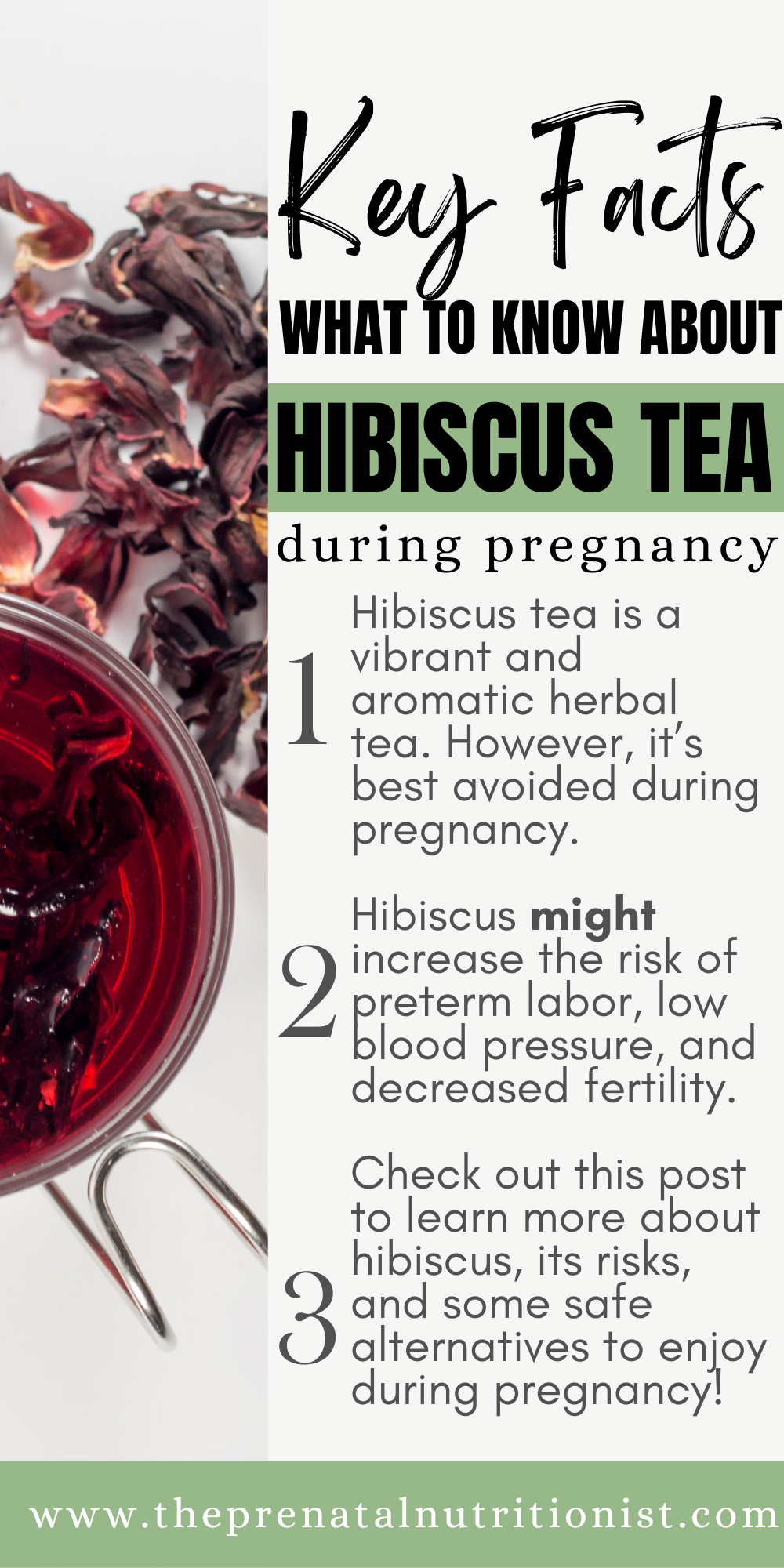
Hibiscus is generally considered safe and may offer health benefits outside of pregnancy. However, due to a lack of data overall, it is recommended to avoid hibiscus during pregnancy.
Hibiscus tea is a delicious variety of tea that is safely enjoyed by many outside of pregnancy. Pregnant women, however, should avoid consuming hibiscus tea. Instead, sip on one of the flavorful alternatives mentioned above!
To learn more about another popular type of tea and whether it’s safe to consume during pregnancy, check out my post, “Does Jasmine Tea Have Caffeine?”
Or, for more information on popular prenatal nutrition topics and proper nutrition during every stage of the pregnancy journey, head over to the blog.
If you enjoyed this post and others on my blog, be sure to check out The Prenatal Nutrition Library. It is a searchable library and app of preconception and pregnancy nutrition information, meal plans, a private podcast, and more. Once you sign up, you can search thousands of topics, foods, and questions for a quick, evidence-based answer.
Download the app for FREE on Apple or Android for a sneak peek inside and enjoy a FREE 1-week meal plan just for signing up!



